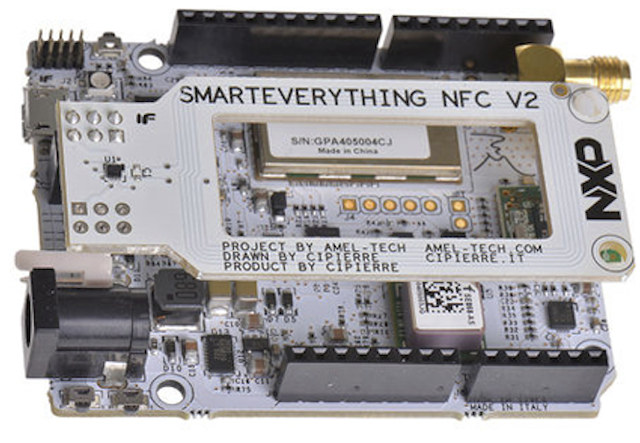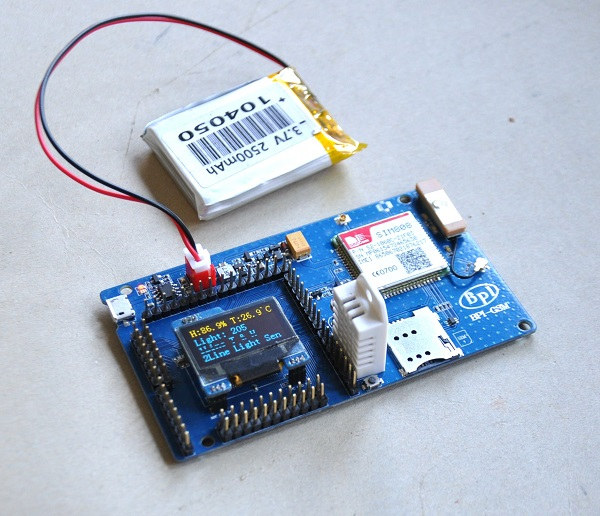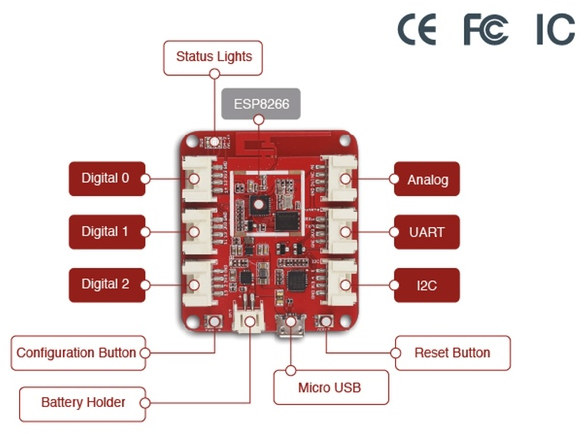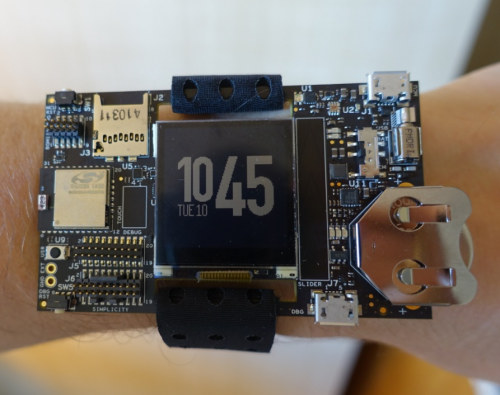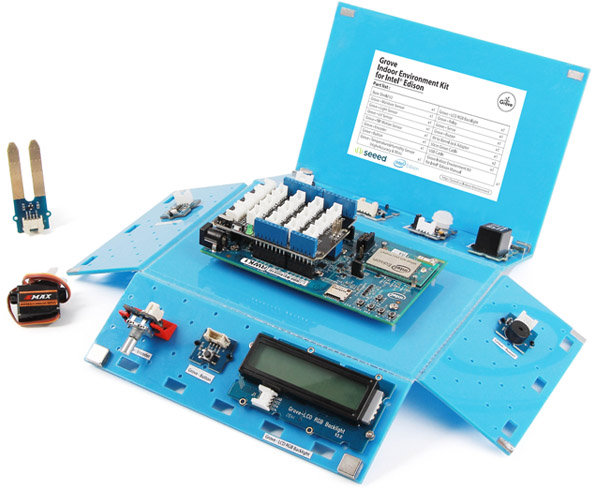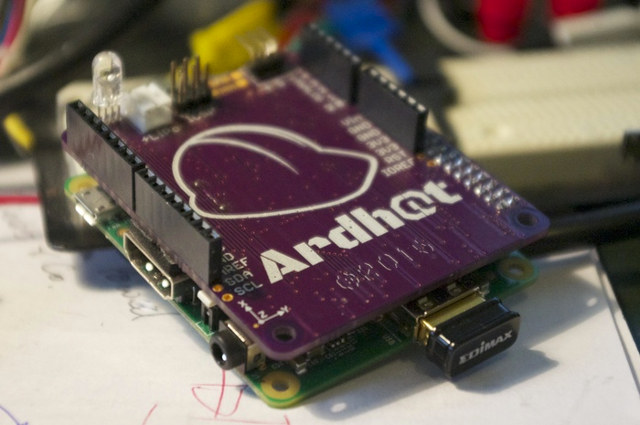Atmel MCU Madness is an informal competition on Twitter where people vote for their favorite development boards. We are now at the quarter finals, and beside the usual suspects such as Raspberry Pi and ESP8266 boards, I also noticed one board that I had never heard of: AXEL Elettronica’s SmartEverything based on Atmel SAM D21 Cortex M0+ and featuring SigFox, BLE, NFC, and GPS connectivity, as well as various sensors such as humidity and temperature, 9-axis motion sensor, and so on. SmartEverything board specifications: MCU – Atmel SAM D21 ARM Cortex-M0+ MCU @ 48 MHz with 256KB Flash, 32KB SRAM Connectivity SIGFOX via Telit LE51-868 S SIGFOX 868 MHz Wireless Module with 12 months of network access included Bluetooth 4.0 LE via TDK SESUB-PAN-T2541 module based on Texas Instruments CC2541 NFC via NXP NT3H1101FHK NFC with separate antenna (included) GPS/GNSS via Telit Jupiter SE868-A GPS/GNSS module with integrated antenna. Supports […]
BPI-GSM Arduino Compatible Board Integrates a GSM & GPS Module, Sensors and an OLED Display
Banana Pi team has come up with another board, but this time it does not run Linux or Android, as they’ve made an Arduino compatible board called BPI-GSM based on Atmel ATmega2560 MCU with a light sensor, DHT22 temperature and humidity sensor, and a GSM/GRPS & GPS module powered by a LiPo battery. BPI-GSM board specifications: MCU – Atmel ATmega2560 8-bit AVR MCU @ 16 MHz with 256 KB flash, 8KB SRAM, 4KB EEPROM Connectivity – Simcom SIM808 GSM, GPRS, and GPS module + SIM card slot + Sensors – DHT22 temperature and humidity sensor, light sensor Display – OLED display Expansion headers – 54x digital I/O (including 14x PWM), 16x analog input, 4x UART. Max DC current per I/O: 40 mA. Misc – Reset button, LEDs Power Supply 5V via micro USB port 3.7V LiPo battery (2,500 mAh battery included in kit) Dimensions – TBD The board can be […]
Embedded Linux Conference 2016 and OpenIoT Summit 2016 Schedule
The Embedded Linux Conference 2016 and the OpenIoT summit 2016 will take place on April 4 – 6, 2016 in San Diego, California, and over 800 attended will meet including kernel & system developers, userspace developers, and product vendors. The Linux Foundation has recently published the schedule, so I’ve had a look at some of the talks, and designed my own virtual schedule to find out more the current development focus although I won’t attend. Monday April 4 10:40am – 11:30am – Linux Connectivity for IoT by Marcel Holtmann, Intel OTC There are many connectivity solutions that available for IoT. For example Bluetooth Low Energy, 802.15.4, Zigbee, OIC, Thread and others. This presentation will provide and overview of the existing technology and upcoming standard and how they tie into the Linux kernel and its ecosystem. 11:40 – 12:30 – BoF: kernelci.org: A Million Kernel Boots and Counting by Kevin Hilman, […]
uRADMonitor Aims to Crowdsource Air Pollution Measurements Worldwide (Crowdfunding)
Some projects such as the World Air Quality Index project are already generating a pollution world map using data from the countries’ respective “Environmental Protection Agency (EPA)”, but a Romanian startup aims to allow individuals to monitor pollution around the world with their uRAMonitor project, effectively crowd-sourcing pollution monitoring. For this purpose, the company created environmental monitors with various features and price points, include the higher-emd Model D with the following specifications: Color LCD with touchscreen LND712 made in the USA for Alpha, Beta and Gamma Radiation Bosch BME680 to measure air temperature, barometric pressure, humidity and VOC (volatile organic compounds) Sharp photoelectric sensor to measure dust, pollen, soot, smoke and other particulate matter 1500mAh rechargeable battery for 8 hours of continuous use Wireless 802.11b/g/n connectivity mini USB connector for charging or data Internal audible alarm when pollution readings are high There’s also model A measuring temperature and radiation, connected […]
Wio Link is an ESP8266 Board Designed to Make IoT Projects Easier (Crowdfunding)
There are already plenty of board or modules based on Espressif ESP8266 WiFi SoC, but if you don’t like soldering, or would rather avoid breadboards and some cables for your or your kids’ projects, Wio Link may be interesting, as all you need to is to connect Grove modules required for your applications to get started, and Seeed Studio also took care of the low level software part and a drag-and-drop mobile app is provided, so software programming has been made easy too. Wio Link hardware specifications: SoC – Espressif ESP8266EX Tensila SoC Storage – 4MB flash Connectivity – 802.11b/g/n WiFi, with WEP/TKIP/AES encryption support Expansion – 6x Grove connectors: 3x digital, 1x analog, 1x UART and 1x I2C (3.3V I/Os) Power Supply 5V via micro USB port 3.4 ~ 4.2V via external battery Output DC Current – 1000mA MAX Charge Current: 500mA MAX Dimensions – 55mm*48mm Weight – 26g […]
Thunderboard Wear is a $75 Smartwatch Development Board by Silicon Labs
A few days ago I watched an ARMDevices.net’s video about an ARM’s smartwatch reference design running mbed OS 3.0, powered by a Silicon Labs EFM32 Giant Gecko Cortex M3 MCU, and promising up to 2 months battery life on a 160 mAh battery. While I could not find the full details about the reference design, I noticed Silicon Labs also launched a development board called Thunderboard Wear, based on the same platform, just quite bigger, and still wearable… (Sort of) Thunderboard Wear specifications: MCU – Silicon Labs EFM32GG995F1024 ARM Cortex-M3 MCU up to 48 MHz with 128 kB RAM,1 MB Flash External Memory – 256 kB external SRAM External Storage – micro SD card slot Display – 128×128 pixel Memory LCD from Sharp Connectivity – Bluetooth 4.1 smart module (Silicon Labs BGM111), upgradeable to Bluetooth 4.2 Sensors Ambient Light Sensing (ALS) and Proximity/Gesture via Silicon Labs Si1141. Optical hear-rate monitoring […]
Seeed Studio Introduces Automation and Wearable Kits for Intel Edison
Intel Edison is a $50 module with a dual core Atom processor @ 500Mhz and a single core Quark MCU @ 100 Mhz, Wi-Fi and Bluetooth 4.0, as well as headers for I/Os that’s destined to be used in wearables and IoT applications. Seeed Studio has now launched two kits for the Intel module for home automation and wearables. Grove Indoor Environment Kit for Intel Edison The automation kit comes in a small blue box with the following parts (Intel Edison and baseboard not included): 1x base shield v2 that plugs into Edison baseboard and allows Grove modules connections 11 grove modules – temperature & humidity, LCD RGB backlight, relay, moisture sensor, servo, light sensor, buzzer, UV sensor, PIR motion sensor, encoder and button. 2x 26 AWG Grove Cables 9V to barrel jack adapter 1x USB cables 1x User guide Programming is done with Edison Arduino IDE as explained in […]
ARDHAT adds Arduino Shield Compatibility, an ISM Band Radio to Raspberry Pi and ODROID-C1 Boards (Crowdfunding)
NinjaBlocks created Pi Crust add-ons board adding a 433MHz radio and Arduino compatibility to the Raspberry Pi Model A & B a few years ago, but the product has since been removed from their store. But a startup called ubIQio has now created a similar product compatible with Raspberry Pi Model A+, B+ and B2, as well as ODROID-C1 which also comes with a 40-pin R-Pi header. The ARDHAT board is a HAT compatible add-on board with an Atmel MCU, Arduino headers, as well as an optional long range mesh ISM radio (433, 868 and 915 MHz) and various sensors. There are four versions of the board: Basic Ardhat, Ardhat-I, and Ardhat-W and Ultra, which share the following specifications: MCU – Atmel MCU @ 16MHz Headers and I/Os Arduino compatible header accepting 5V Arduino shields 12 ch PWM O/P, 6 ch analog I/P Real-time Clock Programmable Power/Navigation combo switch Programmable […]


